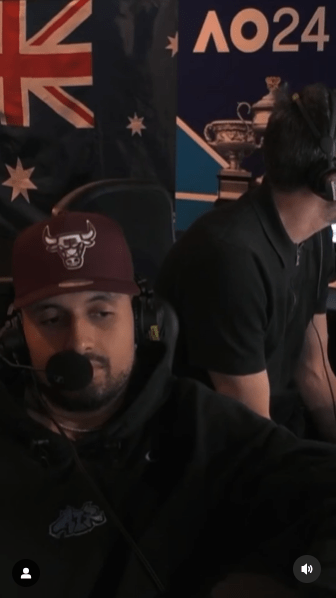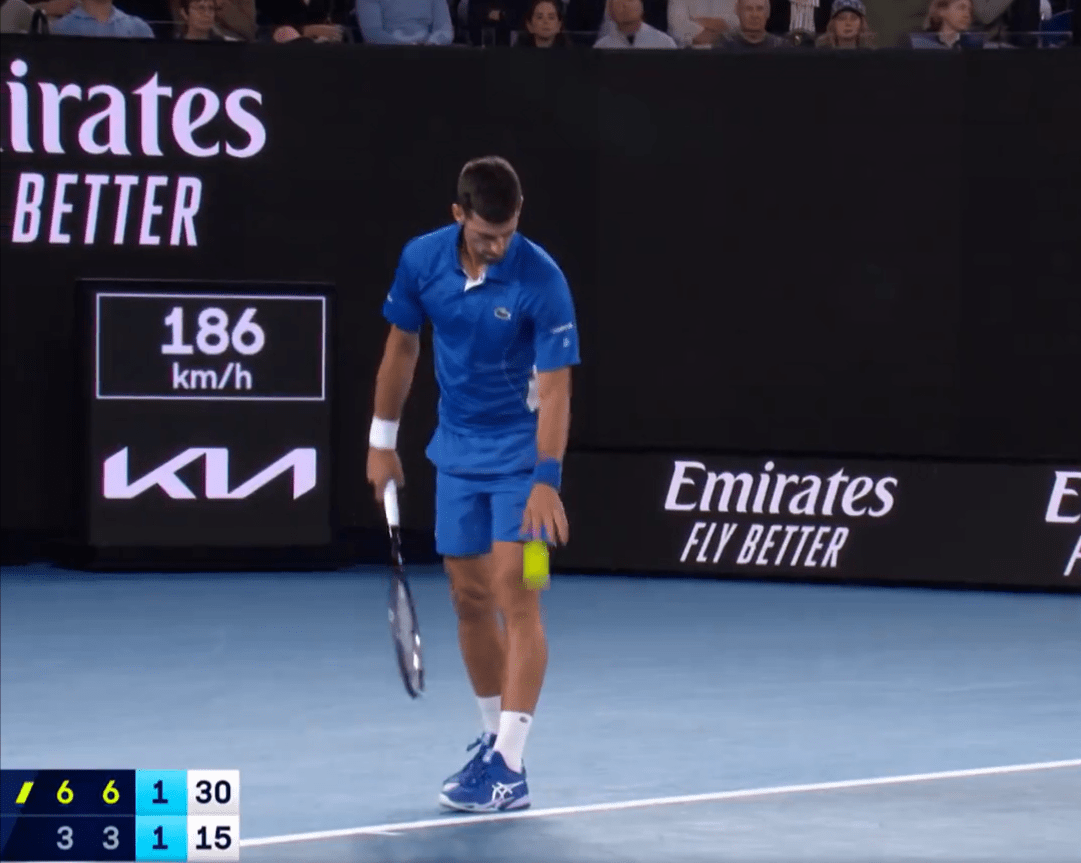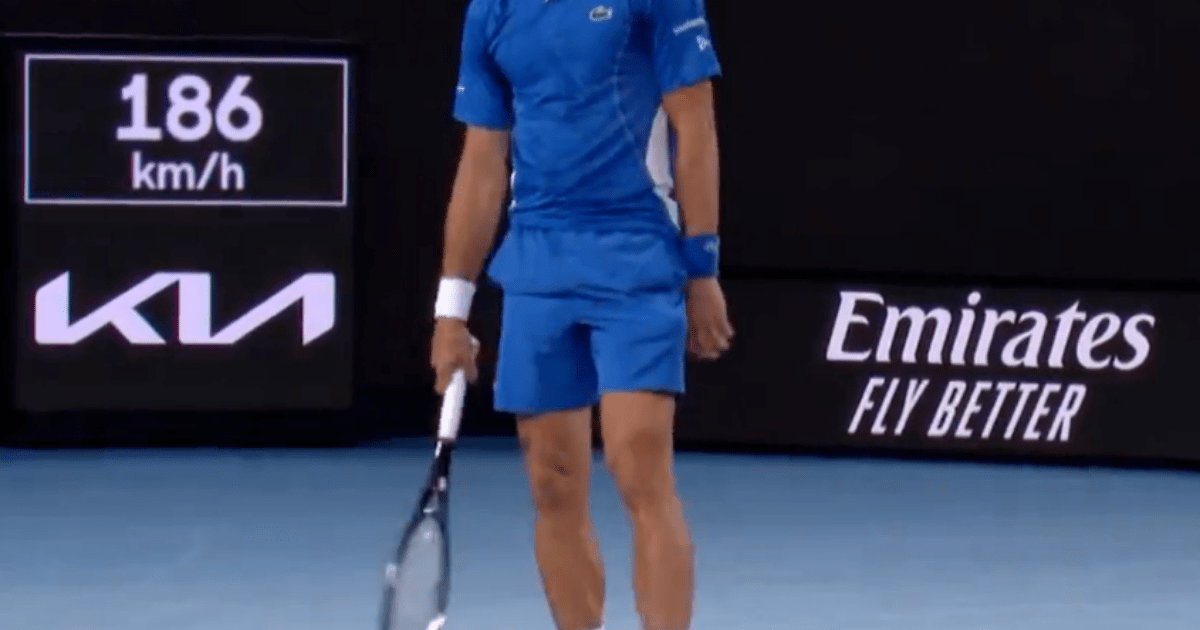Outspoken Commentary
Aussie tennis star Nick Kyrgios didn't hold back in the commentary box as he criticized an umpire for giving Novak Djokovic a time violation during the Australian Open.
Kyrgios' New Role
Injured and unable to play in his home Grand Slam, Kyrgios has taken on a new role as a commentator and pundit for Eurosport.
Djokovic's Warning
During Djokovic's third-round match against Tomas Martin Etcheverry, the world No.1 received a time violation warning for taking too long to serve.
Kyrgios' Frustration
Kyrgios audibly expressed his frustration on the mic, calling the umpire's decision "ridiculous" and claiming it ruined the flow of the match.

Social Media Reaction
Fans were divided on the controversial call and Kyrgios' response, with some supporting Djokovic and others backing Kyrgios' criticism of the umpire.
Kyrgios' Commentary Style
Later on, Kyrgios' relaxed demeanor in the commentary box was the subject of a light-hearted conversation between Tim Henman, Mats Wilander, and new host Rachel Stringer.
From Enemies to Friends
Kyrgios and Djokovic, who had a contentious relationship in the past, have seemingly become friends after their Wimbledon final in 2022.
Djokovic's Continued Success
Djokovic went on to win the match against Etcheverry and will face Adrian Mannarino in the fourth round.

Frequently Asked Questions
What is the importance of competing in junior tennis tournaments to pursue a professional career?
Junior tournaments are a vital step on the road to a tennis professional career. These tournaments offer young athletes the opportunity to prove their abilities against their peers and gain valuable match-experience. They can also learn to deal with the psychological demands that come with competitive play. Junior tournaments also serve as a stepping stone to higher-level competitions and can significantly impact a player’s ranking, visibility to coaches and sponsors, and their overall development as a player.
How important are nutrition and diet in training to become an elite tennis player?
Tennis players are no different. Nutrition and diet is vital to any athlete who wants to perform at their best. A proper diet is essential for intense training, as it helps to provide energy, promotes recovery, and reduces injury risk. A balanced diet for elite players includes carbohydrates, proteins and fats along with essential vitamins, minerals and nutrients. Hydration is another critical aspect, as maintaining good fluid balance is crucial to prevent fatigue and maintain concentration during play.
Can someone play tennis late and become a professional player?
It is possible to play tennis professionally at an older age, even though it may be more difficult. The individual’s ability to play tennis, their work ethic and dedication, as well as the access they have to coaching and competition, will determine whether or not they are successful. Late starters will need to engage in highly focused and intensive training, and the path may be more arduous, but with talent and perseverance, reaching a professional level is within the realm of possibility.
What kind of fitness training is essential for tennis players
Tennis is an intense sport that demands a combination aerobic endurance, anaerobic strength and power, as well as speed. Tennis players are often required to do cardiovascular exercises in order to improve their endurance. They also need to perform plyometrics, explosive exercises, and weight training exercises in order to gain strength. Exercises that improve core stability and balance are essential to building the endurance and coordination needed for tennis.
How can tennis players balance their training with schoolwork?
Balance between academic obligations and intensive training schedules can be difficult for aspiring players. Time management, prioritization skills and sometimes creative scheduling are required. Online schooling and flexible academic programs can help accommodate the demanding training and travel schedule of young athletes. Families, coaches and educational institutions can also play a vital role in helping athletes achieve their athletic goals without compromising their studies.
Statistics
- On average, it’s estimated that only 1 in 5000 high-level junior tennis players will develop into internationally ranked professionals.
- Research indicates that junior tennis players who compete in international tournaments gain significant psychological advantage and experience, with participation leading to a 50% better transition into professional rankings.
- Studies show that superior agility and speed among tennis players can reduce their reaction time by up to 30%, which is crucial during high-level matches.
- Approximately 70% of a professional tennis player’s training time is devoted to developing technique and on-court strategies.
- Top tennis players typically train for 4 to 6 hours per day, divided between on-court practice and fitness training.
External Links
itftennis.com
topendsports.com
tenniscompanion.org
myprocoach.net
wilsontennis.com
How To
How to Improve Your Tennis Serve
To develop a powerful tennis serve, begin by mastering the grip. Use a Continental grip to increase racket head speed and control. Next, ensure your stance is correct – typically, this means standing at a forty-five-degree angle to the baseline. Tossing high enough for you to be able to hit it with full extension of your arms without reaching is essential. Engage your legs by bending your knees and driving up into the ball as you swing, using your whole body to generate power, not just your arm. The ‘trophy pose,’ with the racket back and elbow up, is a good checkpoint to ensure your serve technique is on track. To maximize racket head velocity, you should focus on a fluid, fluid motion. Make sure to snap the hand at the contact point. With consistent practice, you will be able to serve more effectively.

